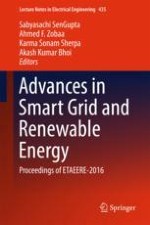2018 | OriginalPaper | Buchkapitel
Renewable Energy Capacity Estimation for Indian Energy Sector Using Energy Demand Forecasting Through Fuzzy Time Series
verfasst von : Shibabrata Choudhury, Aswini Kumar Patra, Adikanda Parida, Saibal Chatterjee
Erschienen in: Advances in Smart Grid and Renewable Energy
Verlag: Springer Singapore
Aktivieren Sie unsere intelligente Suche, um passende Fachinhalte oder Patente zu finden.
Wählen Sie Textabschnitte aus um mit Künstlicher Intelligenz passenden Patente zu finden. powered by
Markieren Sie Textabschnitte, um KI-gestützt weitere passende Inhalte zu finden. powered by
